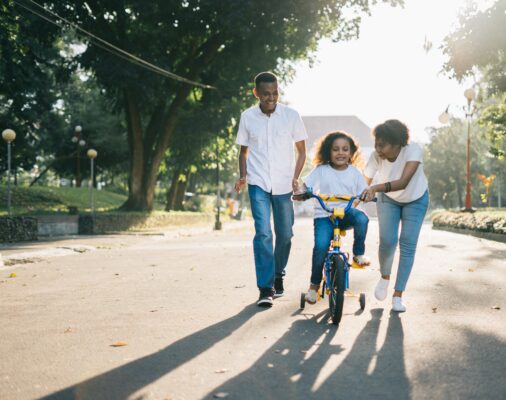
I remember the first time I heard the term “helicopter parenting.” I was watching Celebrity Wife Swap and one of the husbands was called out for hovering too much, I agreed. Within seconds, I started thinking about my own parenting style.
I’ve been accused of being overprotective, but a helicopter parent? Was I one of those? So what if I’m frequently right on top of my kid? Is that necessarily a bad thing? Does that really classify me as a helicopter parent?
Years later, I’m honestly beginning to think that the term is vastly overused.
We all have our own techniques. We all have our days when our child requires more attention than usual. In my case, there are several perfectly legitimate reasons why I’ve appeared to be a smother mother.
Here’s why I’ve been a helicopter parent, and why that’s perfectly OK:
1. Children with physical challenges require more hands-on parenting.
Some disabilities aren’t visible to the naked eye. My daughter appeared totally normal, but around the time of her first birthday, she was diagnosed with hypotonia, or “low muscle tone.” It isn’t a serious issue, but requires lots of physical therapy.
Largely due to her low muscle tone, she didn’t walk until eighteen months. When she did, she wasn’t steady on her feet. She struggled with balance as well. Because of these issues, I was never too far behind her at the park or on playground equipment.
Early on, she didn’t have the same strength as her similarly-aged peers. I’d often help her with every climb and step. I got some looks and criticisms, but I didn’t care; I was keeping her safe while allowing her to get stronger — and she did.
At six years old, my daughter is your typical little girl who loves to run and play. She no longer needs mom on top of her to make sure she doesn’t take a fall.
2. And the same goes for children with neurological issues.
Along with my daughter’s physical issues, she’s had a few sensory ones. Because of her struggles in movement, she was often anxious in a playground setting.
She was very sensitive to noise and any other distractions, but she was most comfortable in a controlled environment; one that was quiet and calm.
If there was a disruption, she would panic. The anxiety made her prone to losing her concentration and balance; thus, she was prone to accidents. In this way, I’d often shadow her in various outdoor settings.
It was beneficial for her well being, and I wouldn’t have changed a thing.
3. They’ll have more diligent parents.
We all remember a time when we swore to never be like our parents. But sometimes, the opposite occurs.
My own parents were fiercely overprotective, and I can sometimes be as well.
4. They’ll have constant playmates.
I like to call this one the little “well kept secret” of the shy and timid adults. I’ve been socially anxious for all of my life. In the past, I’ve used my children as a crutch.
They come in handy when I’m at a party and don’t know anyone. For me, it’s easier and more fun to hang out with the kids in the playroom and organize a game of Twister.
5. They’ll get more exercise on a daily basis.
As a kid, I was neither particularly active nor athletic. I was the child that liked to sit on the sidelines and observe; simply put, I was very lazy.
As an adult, I’m trying to be a good role model for my children.
We go outdoors as often as the weather permits. We like to explore, we walk a lot. At the park, I enjoy running around with them. It helps keep me in shape, and I like to think it keeps me young.
I’m better able to keep up with my kids who have much more energy. Plus, it’s so much fun!
6. They’ll heal faster.
We can all relate to this one. Your kid is under the weather and super clingy, and we do our best to give her extra love and cuddles.
In this situation, we’re willing to do anything for her, just as long as she gets better.
7. They’ll have close attention paid to them.
My firstborn child was born with a congenital heart defect. He died after only nine days. The experience left me heartbroken; it also left me vulnerable.
I couldn’t imagine anything ever happening to my subsequent children. Every time they got sick or hurt, I feared the worst.
I kept them very near and dear and was, at times, afraid to let them go.
Originally written by Kathleen Sullivan on YourTango
Featured image via Pexels


















